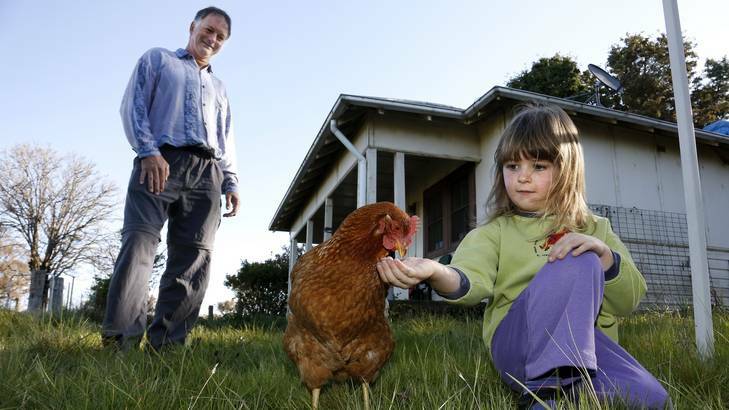Andrew Collins is supposed to leave his mouldering little circa 1920s cottage near Coppin's Crossing by 9am this morning, handing over the key and never coming back again.
Subscribe now for unlimited access.
$0/
(min cost $0)
or signup to continue reading
He's been blissfully happy there for six years. But now the cottage (with its accompanying cluster of quaintly dilapidated sheds, stables and pens) is right in the path of the next stage of the inevitable and irresistible John Gorton Drive.

''John Gorton Drive stage two is my nemesis,'' he says.
Just over the hill from the cottage he's lived in and loved for six years, the Molonglo Valley developments are under way. The suburbs are coming.

He has had six idyllic years there and is melancholy, but not militant, about having to go.
Visiting him, we fell to wondering together how unhappy John Gorton might be, looking down, to have to suffer having an ugly old highway named after him, let alone a highway that has to flatten a dear, old, (just) habitable home.
When Mr Collins claims, sadly, that ''I'm the last resident of South Molonglo Valley'', what he means is that he's the last resident of it as it's been, bucolic and grassy grazing farmland, for the last 150 years.
At the moment it is, save for the decomposing cottage on its knoll, very much as John Coppin (from whom nearby Coppin's Crossing of the moody, meandering Molonglo gets its name) knew it when he took charge of Goat Station in (probably) the 1860s.

Coppin, the scant remains of his homestead still there (Collins took this reporter to them), would still recognise every landmark today but if his ghost is going to make that pilgrimage it had better hurry.
The spot will be transformed. Suburbs yet to be named, perhaps after still living Australians yet to obligingly die (for you must be both distinguished and dead to have this honour) will swarm over, and an estimated 55,000 folk will live here where cattle, sheep, goats and kangaroos once grazed and wombats once burrowed.
When he first moved in to the place his landlord was a rural leaseholder, Frank Coonan.
But then in his words the Coonans were ''booted out'' by the ACT government and ever since that government has been his, Mr Collins's, landlord.
''I'm passing on what I was told [by Coonan] that this house was built in the 1920s after the station owner, left without a stockman on one side of the Molonglo river after a massive flood, said 'Stuff this. I'll build a house and put a stockman in it on the south side of the river'. And that's what he did.''
When Mr Collins's then wife was pregnant ''I thought this would be the best place to bring up a kid. And it sure has been''.
He says his daughter Grace has loved the funny old bungalow and its chook-infested gardens.
From its verandah (across which, in his golden years of occupancy, he slung a two-person hammock) we looked with admiration at the fabulous view. Away in the distance the flag fluttered above Parliament House.
Collins, with a legal background, used to work in Civic at the Assembly and used to commute to and from the city on his mountain bike across paddocks and along fence lines. ''What I always wanted,'' he laughs, ''was to ride a horse to work''. But the killjoy Assembly wouldn't allow it.
He took me in his Subaru across paddocks in a tour of nearby ruins. Black cows with green ear tags stared at us in astonishment and kangaroos, not panicked but just inconvenienced by us, cleared away, sometimes with elegant glides over low fences, going in the rough general direction of the pioneering beginnings at the new suburbs of Coombs and Wright.
One visited cluster of ruins has been boxed in by fences with signs on them saying ''Protected Heritage Site. Do not disturb.'' But what little is left of the Coppin's homestead is unprotected and, Collins fears, is doomed. ''When they bulldoze the area they're going to bump into a stone fireplace, some stone remains, but the machines are so big they probably won't even notice.''
Collins can quite understand why this is an obvious place to build some suburbs, and it's not as if he's going to have to throw himself on the mercy of the Salvos. But the end of his tenancy coincides with and is symbolic of the end, for ever, of South Molonglo as its been, and on the doomed cottage's verandah there was melancholy so palpable you could almost reach out and touch it.
''It's been fantastically peaceful here. It's been really quite special,'' he mused and then had to go and get on with his packing.

